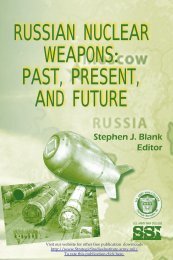The United States and China in Power Transition - Strategic Studies ...
The United States and China in Power Transition - Strategic Studies ...
The United States and China in Power Transition - Strategic Studies ...
Create successful ePaper yourself
Turn your PDF publications into a flip-book with our unique Google optimized e-Paper software.
more proactive than the tao-guang yang-hui, which is<br />
primarily about avoid<strong>in</strong>g confrontation. Thus <strong>in</strong> addition<br />
to develop<strong>in</strong>g its capabilities through the modernization<br />
mission, <strong>Ch<strong>in</strong>a</strong> will engage with the <strong>United</strong><br />
<strong>States</strong>, confront the <strong>United</strong> <strong>States</strong> if necessary, but stop<br />
short of go<strong>in</strong>g to war. It is a strategy loaded with Sun<br />
Tzu’s teach<strong>in</strong>g, the most familiar of which is about<br />
subjugat<strong>in</strong>g the enemy without fight<strong>in</strong>g.<br />
U.S. Options.<br />
<strong>The</strong> “law of physics” <strong>in</strong>forms us that the <strong>United</strong><br />
<strong>States</strong> <strong>and</strong> <strong>Ch<strong>in</strong>a</strong> should not go to war aga<strong>in</strong>st each<br />
other. However, as discussed <strong>in</strong> this analysis, the two<br />
nations have plenty of reasons to do otherwise. Perhaps<br />
the most fundamental conflict is over the way of<br />
government between the two nations. For well over 60<br />
years, the <strong>United</strong> <strong>States</strong> has been at odds with <strong>Ch<strong>in</strong>a</strong><br />
over its government <strong>and</strong> its conduct <strong>in</strong> domestic as<br />
well as <strong>in</strong>ternational affairs. <strong>The</strong> conflict is <strong>in</strong> essence<br />
part of the Cold War the <strong>United</strong> <strong>States</strong> fought with the<br />
Soviet Union. <strong>The</strong> Soviet communists are long gone.<br />
Yet the Ch<strong>in</strong>ese Communist Party has preserved its<br />
authoritarian rule <strong>and</strong> relied on that rule to br<strong>in</strong>g<br />
about <strong>Ch<strong>in</strong>a</strong>’s rise <strong>in</strong> the last 30 years. <strong>The</strong> economic<br />
success has given the CCP’s rule a new lease on life.<br />
<strong>The</strong> Ch<strong>in</strong>ese leaders are determ<strong>in</strong>ed to cont<strong>in</strong>ue their<br />
authoritarian government <strong>in</strong> <strong>Ch<strong>in</strong>a</strong> for the next 30<br />
years or longer.<br />
<strong>The</strong> <strong>United</strong> <strong>States</strong>, however, <strong>in</strong>sists that <strong>Ch<strong>in</strong>a</strong>’s<br />
authoritarian regime, no matter how useful it is for<br />
<strong>Ch<strong>in</strong>a</strong>’s development, is a transitional fix. <strong>The</strong> <strong>United</strong><br />
<strong>States</strong> will not only cont<strong>in</strong>ue to take issue with <strong>Ch<strong>in</strong>a</strong><br />
over its repressive government, but will also engage<br />
with <strong>Ch<strong>in</strong>a</strong> <strong>in</strong> attempts to manage its rise, shape the<br />
174

















